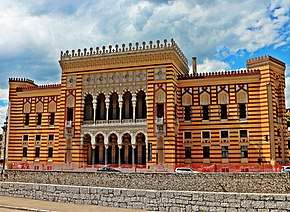Alexander Wittek
Alexander Wittek (12 October 1852, Sisak – 11 May 1894, Graz)[1] was an Austrian-Hungarian architect and chess master.
Alexander Wittek | |
|---|---|
| Born | 12 October 1852 Sisak, Austro-Hungarian Monarchy |
| Died | 5 November 1894 (aged 41) Graz, Austro-Hungarian Monarchy |
| Nationality | Austrian |
| Occupation | Architect |
As an architect, Wittek worked in Bosnia and Herzegovina during Austro-Hungarian Empire. His most well-known works in Sarajevo are the City Hall building called "Vijećnica" (1892–1894)[2] which later became the National Library and the Sebilj public fountain (1891), both of which were built in the pseudo-Moorish style.[3]
Wittek was also a chess master. He tied for 5–6th at Berlin 1881 (2nd DSB–Congress, Joseph Henry Blackburne won), and was in 9th place at Vienna 1882 (Wilhelm Steinitz and Simon Winawer won). In 1882 he was ranked 9th in the world.[4]
Wittek died in a lunatic asylum in Graz in 1894, having been diagnosed with a "paralytic mental disorder" the previous year.[5] One source says that he committed suicide[3] but another cites tuberculosis.[5]

.jpg) Sebilj (1891)
Sebilj (1891).jpg) Sebilj in 1897
Sebilj in 1897
References
- "Archived copy". Archived from the original on 2012-09-05. Retrieved 2008-10-09.CS1 maint: archived copy as title (link)
- "Culture and Cultural Heritage at the Council of Europe – Homepage" (PDF). Culture and Cultural Heritage.
- Guide, Sarajevo. "Sarajevo – Bosnia and Herzegovina – Attractions". www.sarajevo-guide.com.
- "Chessmetrics Player Profile: Alexander Wittek". chessmetrics.com.
- http://www.klinikum-graz.at/cms/dokumente/10094691_2096265/888a95f9/Ztg%20KlinOptikum%206_07%20druckverson_070725n.pdf%5B%5D